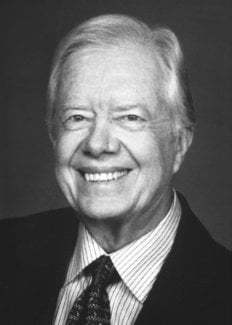Jimmy Carter
Biographical

Jimmy Carter (James Earl Carter, Jr.), thirty-ninth president of the United States, was born October 1, 1924, in the small farming town of Plains, Georgia, and grew up in the nearby community of Archery. His father, James Earl Carter, Sr., was a farmer and businessman; his mother, Lillian Gordy, a registered nurse.
He was educated in the Plains public schools, attended Georgia Southwestern College and the Georgia Institute of Technology, and received a B.S. degree from the United States Naval Academy in 1946. In the Navy he became a submariner, serving in both the Atlantic and Pacific fleets and rising to the rank of lieutenant. Chosen by Admiral Hyman Rickover for the nuclear submarine program, he was assigned to Schenectady, N.Y., where he took graduate work at Union College in reactor technology and nuclear physics, and served as senior officer of the pre-commissioning crew of the Seawolf, the second nuclear submarine.
On July 7, 1946, he married Rosalynn Smith of Plains. When his father died in 1953, he resigned his naval commission and returned with his family to Georgia. He took over the Carter farms, and he and Rosalynn operated Carter’s Warehouse in Plains, a general-purpose seed and farm supply company. He quickly became a leader of the community, serving on county boards supervising education, the hospital authority, and the library. In 1962 he won election to the Georgia Senate. He lost his first gubernatorial campaign in 1966, but won the next election, becoming Georgia’s 76th governor on January 12, 1971. He was the Democratic National Committee campaign chairman for the 1974 congressional and gubernatorial elections.
On December 12, 1974, he announced his candidacy for president of the United States. He won his party’s nomination on the first ballot at the 1976 Democratic National Convention, and was elected president on November 2, 1976.
Jimmy Carter served as president from January 20, 1977 to January 20, 1981. Significant foreign policy accomplishments of his administration included the Panama Canal treaties, the Camp David Accords, the treaty of peace between Egypt and Israel, the SALT II treaty with the Soviet Union, and the establishment of U.S. diplomatic relations with the People’s Republic of China. He championed human rights throughout the world. On the domestic side, the administration’s achievements included a comprehensive energy program conducted by a new Department of Energy; deregulation in energy, transportation, communications, and finance; major educational programs under a new Department of Education; and major environmental protection legislation, including the Alaska National Interest Lands Conservation Act.
President Carter is the author of seventeen books, many of which are now in revised editions: Why Not the Best? 1975, 1996; A Government as Good as Its People, 1977, 1996; Keeping Faith: Memoirs of a President, 1982, 1995; Negotiation: The Alternative to Hostility, 1984; The Blood of Abraham, 1985, 1993; Everything to Gain: Making the Most of the Rest of Your Life, written with Rosalynn Carter, 1987, 1995; An Outdoor Journal, 1988, 1994; Turning Point: A Candidate, a State, and a Nation Come of Age, 1992, Talking Peace: A Vision for the Next Generation, 1993, 1995; Always a Reckoning, 1995; The Little Baby Snoogle-Fleejer, illustrated by Amy Carter, 1995; Living Faith, 1996; Sources of Strength: Meditations on Scripture for a Living Faith, 1997; The Virtues of Aging, 1998; An Hour before Daylight: Memories of a Rural Boyhood, 2001; Christmas in Plains: Memories, 2001; and The Nobel Peace Prize Lecture, 2002. In 2003, he will publish his first novel, The Hornet’s Nest, a story of the American Revolution.
In 1982, he became University Distinguished Professor at Emory University in Atlanta, Georgia, and founded The Carter Center. Actively guided by President Carter, the nonpartisan and nonprofit Center addresses national and international issues of public policy. Carter Center fellows, associates, and staff join with President Carter in efforts to resolve conflict, promote democracy, protect human rights, and prevent disease and other afflictions. Through the Global 2000 program, the Center advances health and agriculture in the developing world.
President Carter and The Carter Center have engaged in conflict mediation in Ethiopia and Eritrea (1989), North Korea (1994), Liberia (1994), Haiti (1994), Bosnia (1994), Sudan (1995), the Great Lakes region of Africa (1995-96), Sudan and Uganda (1999), and Venezuela (2002-2003). Under his leadership The Carter Center has sent forty-five international electionmonitoring delegations to elections in the Americas, Africa, and Asia. These include Panama (1989), Nicaragua (1990), Guyana (1992), Venezuela (1998), Nigeria (1999), Indonesia (1999), East Timor (1999), Mexico (2000), China (2001), and Jamaica (2002).
The permanent facilities of The Carter Presidential Center were dedicated in October 1986 and include the Jimmy Carter Library and Museum, administered by the National Archives. Also open to visitors is the Jimmy Carter National Historic Site in Plains, administered by the National Park Service.
Jimmy and Rosalynn Carter volunteer one week a year for Habitat for Humanity, a nonprofit organization that helps needy people in the United States and in other countries renovate and build homes for themselves. He also teaches Sunday school and is a deacon in the Maranatha Baptist Church of Plains. For recreation, he enjoys fly-fishing, woodworking, jogging, cycling, tennis, and skiing. The Carters have three sons, one daughter, eight grandsons, and three granddaughters.
This autobiography/biography was written at the time of the award and later published in the book series Les Prix Nobel/ Nobel Lectures/The Nobel Prizes. The information is sometimes updated with an addendum submitted by the Laureate.
Nobel Prizes and laureates
Six prizes were awarded for achievements that have conferred the greatest benefit to humankind. The 12 laureates' work and discoveries range from proteins' structures and machine learning to fighting for a world free of nuclear weapons.
See them all presented here.
